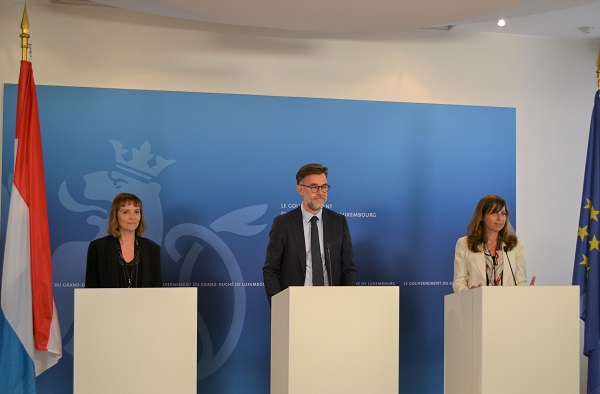 L-R: Cindy Bauwens, head of SOLVIT Luxembourg centre; Franz Fayot, Luxembourg's Minister of the Economy; Anne Calteux, Head of Representation of European Commission in Luxembourg;
Credit: MECO
L-R: Cindy Bauwens, head of SOLVIT Luxembourg centre; Franz Fayot, Luxembourg's Minister of the Economy; Anne Calteux, Head of Representation of European Commission in Luxembourg;
Credit: MECO
On Thursday 2 June 2022, during a press conference organised together with the Representation of the European Commission in Luxembourg, the Minister of the Economy, Franz Fayot, presented the results and future prospects of SOLVIT, which this year celebrates 20 years of existence.
Aimed at both citizens and businesses, SOLVIT is a free public service set up by the European Commission in 2002. Its mission is to resolve amicably problems related to the poor application of European legislation by public administrations within the European Union (EU).
With 30 branches located in each EU Member State, as well as in Iceland, Liechtenstein and Norway, the SOLVIT centres (named after the English term "solve it") operate as a network, enabling European citizens and businesses to lodge a complaint in the language of their choice, among the 25 official languages of the EU, and generally obtain a solution within ten weeks, without having to initiate legal action. Increasingly well known among European citizens, the service remains too little used by companies, which are the source of only 5% of the total volume of complaints received by the network (151 complaints in 2021 out of a total of 2,455 ) - a constant percentage since 2002.
In the space of 20 years, the volume of activities of the SOLVIT network has grown dramatically, mainly among citizens. While in 2002 the network handled a total of 38 cases, in 2021 it handled 2,455 cases, i.e. almost 65 times more, while the number of centres has increased from eighteen (including that of Luxembourg) to 30. Nearly 70% of the complaints received concern citizens who have encountered difficulties linked to the free movement of people, while difficulties linked to the free movement of goods and cross-border taxation, generally from companies, concern only 8% of cases. These trends are similar within the SOLVIT Luxembourg centre, which published its annual report last April.
After an introduction by Anne Calteux, Representative of the European Commission in Luxembourg, Minister Fayot recalled the importance of the single market for a small open economy like Luxembourg, while underlining the major challenges that this European acquis must face with the closure of certain borders and geopolitical tensions. He referred to the central role played by SOLVIT in the application of Community law and highlighted some areas for improvement for the SOLVIT network and the single market in general.
He stated: "With SOLVIT, Luxembourg citizens and businesses have access to a very useful and free service to better assert their fundamental rights within the European single market. In the space of 20 years, SOLVIT has experienced considerable growth and I am delighted with the success of this method of resolving disputes, which presents a real alternative to legal action and which contributes to strengthening the confidence of citizens and businesses in the European project. The challenge now is to strengthen its legal basis and make it better known to companies".
Cindy Bauwens, head of the SOLVIT Luxembourg centre, then briefly presented the functioning, the main legal fields and the number, origin and evolution of the cases handled by the Luxembourg centre.
Charel Donven, member of the committee of the ACEL student organisation, was present to testify about his experience with the services of SOLVIT, requested by ACEL due to a suspicion of tax evasion on the part of of the German authorities vis-à-vis several Luxembourg students staying in Germany and in possession of cars registered in Luxembourg.
Mary Veronica Tovšak Pleterski, Director of Single Market Enforcement (GROW.E) at the European Commission, then traced the history, evolution and prospects of the European network as a whole and highlighted the importance of the role of SOLVIT in the single market rules implementation policy. She said: "The SOLVIT network underlines that we – Member States and the European Commission – work together in partnership to ensure the correct implementation and application of EU law – and have been doing so for 20 years".
Finally, Agnès Merz, member of the Luxembourg Philharmonia, in turn, presented the situation encountered by the musicians of the symphony orchestra, wrongly considered as posted workers during a trip to Italy and how the support of SOLVIT was invaluable in settling this dispute.
To mark the 20th anniversary of the network, SOLVIT Luxembourg has published a report "Anniversaire du réseau SOLVIT". The SOLVIT website has also been revamped and has been online since the beginning of the month.








